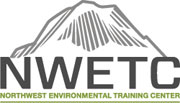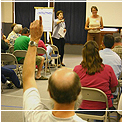|
Description: This two-day course provides a core program of theory, discussion and practice designed to develop attendees' basic and more advanced facilitation skills. Facilitation skills are used to form productive teams, plan programs, and to implement controversial projects. Trained facilitators help groups communicate productively, constructively manage diverse points of view, and create concrete actions as a result of meetings. It is also a personally satisfying experience when you, as the meeting facilitator, bring out the best in the people in a meeting and can help a team improve its performance.
After reviewing basic facilitation skills such as how to set up a meeting for success (writing objectives, sharing agendas, etc.), the instructor will introduce and provide opportunity to practice techniques for facilitating groups with specific goals. For example, certain methods are utilized when answers need to be generated, and others are used to facilitate groups that need to make decisions. In addition, time will be allocated to practice techniques to handle difficult behaviors.
A study by Microsoft® pointed to worthless meetings as a major time waster in America. Respondents in their survey spend 5.6 hours each week in meetings and 71 percent of these people think those meetings “...aren’t productive.” Good meetings don't just happen.
Leaders with outstanding facilitation skills are key to turning this wasted time into meetings that produce results. This course is intended for anyone who wants to increase their personal effectiveness and have greater influence over the work they do in groups. Government folks (managers and staff) need at minimum these basic skills." Heidi C. Dec 2015 "The idea that meeting prep is necessary and shows respect to your attendees should be on all hosts minds" Debbie S. Dec 2015 "The training and materials have given me a much-needed orientation toward respectful and effective facilitation rather than just plowing through an agenda as rapidly as possible. I’ve already been using several of the techniques, and your training has made me a better meeting participant when I’m not facilitating. And I loved the music!" G. Husak, April 2015 "I thought it was the best course on facilitation that I have taken" A. Dirnberger, April 2015 “The range of skills and tools that were taught that cover from pre-meeting planning through meeting wrap up and post meeting work. Great ideas and techniques that will come in handy in lots of situations.” S. Johnson, May 2013 " [The class was] great, [insructor was] calming, made for a very safe environment. I tend to be very nervous and I felt comfortable!" L. McNearney, March 2013 |
Additional Discounts for registering related courses: There is an additional $50 discount when registering for either Collaborative Negotiation Skills for Environmental Professionals OR Conflict Resolution Skills for Environmental Professionals when they are offered in the same week. The two registrations must be made at the same time to get the discount. There is an additional $100 discount when registering for all three classes when they are offered the same week. Registration for all three classes must be made at the same time. *Reduced tuition is available for Native American tribes, government employees, nonprofits, students and AFS, NAEP, NEBC, TAEP members. You may register online or by calling the Northwest Environmental Training Center at (425) 270-3274. Online registration is strongly encouraged. Please wait to receive a course confirmation email, roughly one month prior to the class, before making any travel arrangements.
Intended Audience: This course is intended for scientists and resource managers who must plan, facilitate or manage meetings or anyone interested in learning facilitation skills. The skills learned in the class are applicable to work groups and project teams, larger staff groups, interdisciplinary teams, multiagency groups, and public meetings.
Past attendees have included senior scientists, technical committee chairs, project leaders, executives, managers, supervisors, technical staff, and clerical, seasonal, and contract employees.
Continuing Education Units: 1.30 CEUs
Course Topics
Perspectives
Why doesn’t everyone think like me?
Meetings
Different meetings for different needs
Roles and Responsibilities -
Who wears what hat?
Planning Meetings
Assessing needs, objectives, and purpose
Process and Content
The two parts of effective meetings
Logistical Considerations
The right room, the right set up
Basic Facilitator Skills
Verbal and nonverbal communication skills
Maintaining rapport
Framing, reframing, and paraphrasing
Managing personal states of being | Basic Facilitation Processes and Their Use
Use the right process
Agenda
Ground rules
Open participation
Presenting information
Collecting information
Analyzing information
Decision making
Closing the meeting
Evaluation
A Facilitator’s Tool Kit
Tools that make meetings better and easier
Managing Group Dynamics
Tracking and assessing audience needs
Skills Practice and Feedback
Creating a safe place to explore
Discussion on Challenges
How to prevent or deal with problems |
About the Instructor
 Mike Fraidenburg designs and delivers facilitation services ranging in format from small technical and task-oriented workgroups to large-audience conferences. He has extensive experience facilitating science intensive issues and, as a certified mediator, using interest-based bargaining techniques to create consensus in his facilitations. His facilitation experience includes international scientific review panels, discovery and coordination meetings of regional groups (e.g., data managers, programmers, statisticians), and program evaluations and strategic planning. Mike has been facilitating online meetings to collect citizen participation input, create consensus opinions of advisory groups, conduct strategic and operational planning, and for training other facilitators in online facilitation techniques.
What to Bring
Please bring a pen or pencil, and notepad if you would like to take notes (you may also choose to take notes in your book). Lunch will be on your own, but drinks and snacks will be provided throughout the day.
Billing Information
In order to guarantee a space in a course, the tuition must be paid in full TWO WEEKS before the first day of the course by either check or credit card. State and government agencies paying with a purchase order are allowed payment under the two-week time frame if a copy of the purchase order is received by NWETC.
If You Need to Cancel
Cancellations*-
With 31 or more days notice, we will offer a 100% refund or credit towards a future course. The credit is good for one year and may be applied to any course.
- With 30-8 days notice, we will offer a course credit towards a future course. The credit is good for one year and may be applied to any course.
- With fewer than 8 days notice, there is no course credit available
*Please note that attendee replacement is welcome at any time
Disability Accommodations
Disability Accommodations:To request disability accommodations, please contact us at info@nwetc.org or 425-270-3274 at least 30 days prior to the event.
|










